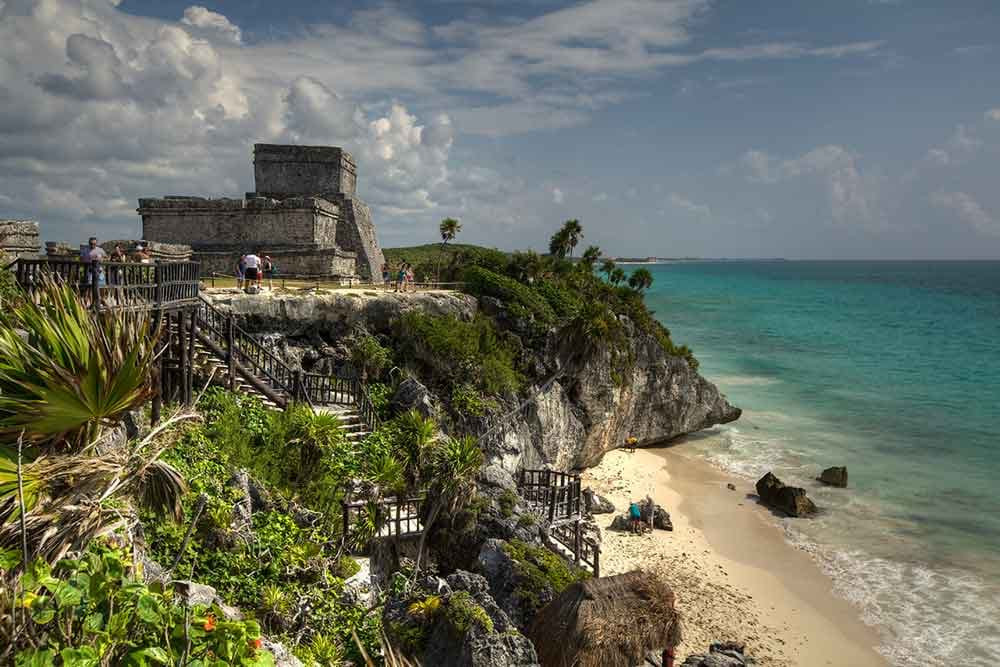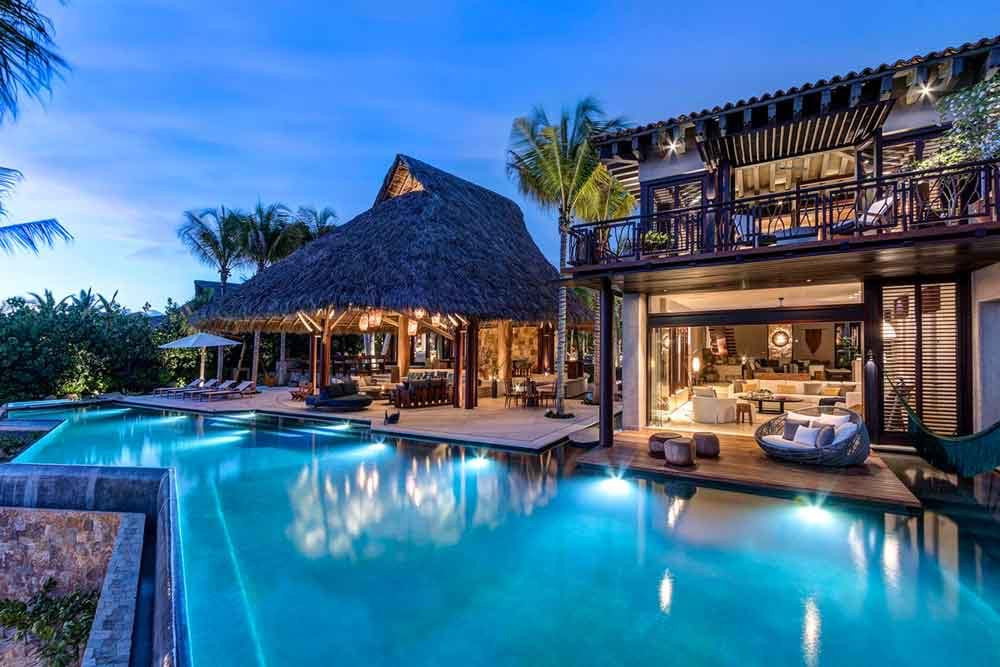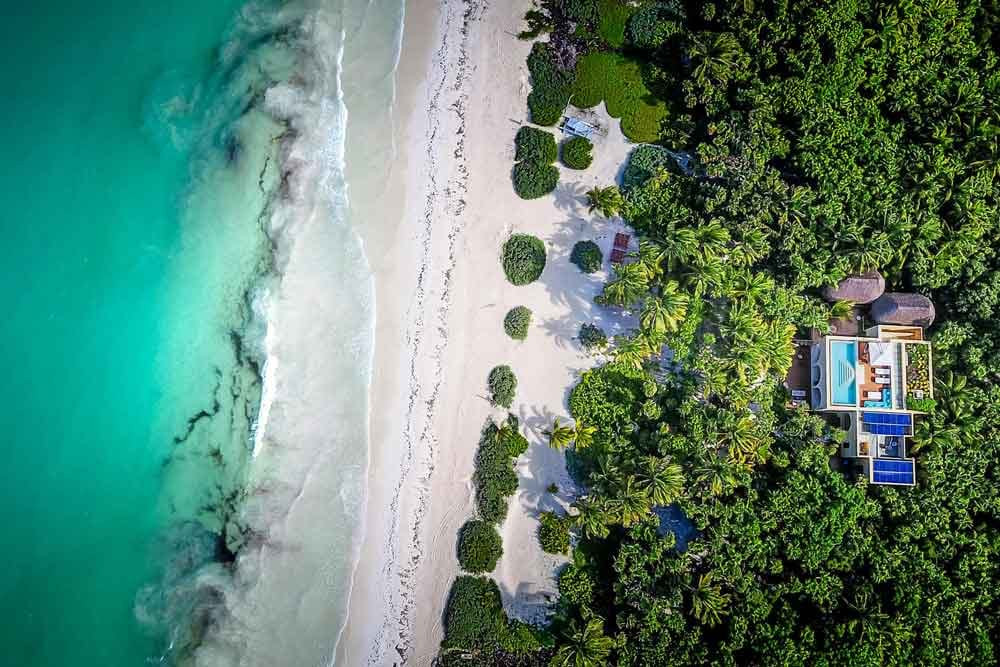Are Resorts Safe In Mexico for LGBTQ+ travelers seeking a memorable and secure vacation? Gaymexico.net is your go-to source for navigating the vibrant and welcoming landscape of Mexico, offering insights into the safest and most enjoyable destinations for the LGBTQ+ community. Discover the best LGBTQ+ friendly places, safe travel tips, and invaluable resources to ensure a worry-free experience, embracing the rich culture and beauty Mexico offers.
1. Understanding Safety Concerns at Mexican Resorts
Are resorts safe in Mexico? Yes, but understanding potential risks and taking precautions is vital. While Mexico is generally welcoming, safety can vary by location. Awareness and preparation are key for a safe and enjoyable trip, especially for LGBTQ+ travelers.
The safety of resorts in Mexico, especially for LGBTQ+ visitors, is a multifaceted issue influenced by several factors:
- Location: Safety levels differ significantly depending on the region. Tourist hotspots are generally safer due to increased security and police presence, but it’s still important to exercise caution.
- Resort Type: All-inclusive resorts often offer a more controlled environment, limiting exposure to external risks. However, it’s still essential to be aware of your surroundings, particularly when venturing outside the resort.
- Time of Year: Weather patterns, especially during hurricane season (June to November), can affect safety and travel plans. It’s wise to monitor forecasts and be prepared for potential disruptions.
1.1 What are the primary safety concerns in Mexico?
While crime rates are a concern, resorts often have security measures in place. It’s wise to research specific locations and resorts for detailed safety information. Tourists should remain vigilant and avoid high-risk areas.
The main safety concerns in Mexico include:
- Petty Theft: Pickpocketing and minor theft can occur in tourist areas.
- Organized Crime: Drug-related violence can affect certain regions, although tourist zones are usually well-protected.
- Natural Disasters: Hurricanes and earthquakes pose risks, particularly during specific seasons.
- Water Safety: Riptides and strong currents can be dangerous on some beaches.
1.2 How do resorts ensure guest safety?
Resorts often implement security measures like surveillance, controlled access, and trained personnel. Many also collaborate with local authorities to ensure guest safety. Choosing a reputable resort can enhance your safety.
Resorts typically ensure guest safety through:
- 24/7 Security: Surveillance cameras, security personnel, and controlled access points.
- Guest Support: Assistance with transportation, excursions, and medical services.
- Emergency Protocols: Evacuation plans and communication systems for natural disasters or other emergencies.
- Staff Training: Training in safety procedures, first aid, and guest relations.
1.3 What role does local law enforcement play in tourist safety?
Local police provide security in tourist areas, but response times can vary. Tourists should know how to contact local authorities in case of emergency. Understanding local laws and customs is also essential for staying safe.
Local law enforcement contributes to tourist safety by:
- Patrolling Tourist Zones: Increased police presence in popular areas to deter crime.
- Responding to Incidents: Investigating crimes and providing assistance to tourists.
- Collaborating with Resorts: Working with resorts to enhance security measures.
- Enforcing Laws: Ensuring compliance with local regulations and maintaining order.
2. LGBTQ+ Safety Considerations in Mexico
Mexico is generally welcoming to LGBTQ+ travelers, but attitudes can vary by region. Researching LGBTQ+-friendly destinations and resorts is essential. Awareness of local customs and laws can help ensure a comfortable and respectful trip.
2.1 Which areas in Mexico are most LGBTQ+-friendly?
Cities like Puerto Vallarta, Mexico City, and Cancun are known for their vibrant LGBTQ+ scenes and welcoming attitudes. These destinations offer numerous LGBTQ+-friendly accommodations, entertainment venues, and cultural events.
 Puerto Vallarta at dusk, showcasing its vibrant cityscape and coastal beauty
Puerto Vallarta at dusk, showcasing its vibrant cityscape and coastal beauty
2.2 What legal protections are in place for LGBTQ+ individuals in Mexico?
Mexico has made significant strides in LGBTQ+ rights, including legalizing same-sex marriage nationwide. Anti-discrimination laws also protect LGBTQ+ individuals in many areas, promoting equality and inclusion.
Legal protections for LGBTQ+ individuals in Mexico include:
| Protection | Details |
|---|---|
| Same-Sex Marriage | Legalized nationwide, providing equal rights and recognition for same-sex couples. |
| Anti-Discrimination Laws | Protect LGBTQ+ individuals from discrimination in employment, housing, and services in many areas. |
| Gender Identity Laws | Allow transgender individuals to change their legal gender on official documents in some states. |
| Hate Crime Laws | Penalize crimes motivated by anti-LGBTQ+ bias. |
2.3 How can LGBTQ+ travelers ensure their safety and comfort?
LGBTQ+ travelers can ensure their safety and comfort by:
- Researching Destinations: Choosing LGBTQ+-friendly locations with a welcoming atmosphere.
- Booking Reputable Accommodations: Selecting hotels and resorts known for their inclusivity.
- Being Aware of Local Customs: Understanding and respecting local cultural norms.
- Using LGBTQ+ Travel Resources: Consulting websites and organizations that provide safety tips and recommendations.
- Staying Connected: Sharing travel plans with friends or family and staying in touch regularly.
3. Choosing Safe Resorts in Mexico
Selecting a safe resort involves research and consideration of security measures, guest reviews, and LGBTQ+-friendliness. Prioritizing resorts with strong safety records and inclusive policies can enhance your travel experience.
3.1 What security features should I look for in a resort?
Look for resorts with 24/7 security, controlled access, surveillance systems, and trained staff. These features can provide a safer and more secure environment for guests.
Essential security features to look for in a resort include:
- 24/7 Security Personnel: Trained security guards monitoring the premises.
- Controlled Access Points: Gated entrances and keycard access to rooms and facilities.
- Surveillance Systems: Security cameras in public areas to deter and monitor activity.
- Emergency Response Plans: Evacuation procedures and communication systems for emergencies.
- Secure Room Access: Well-maintained locks and security features on room doors and windows.
3.2 How can I research a resort’s safety record?
Check online reviews, travel forums, and official websites for safety-related information. Consulting travel advisories and government resources can also provide valuable insights.
Methods to research a resort’s safety record:
- Read Online Reviews: Check sites like TripAdvisor, Google Reviews, and Expedia for guest feedback on safety.
- Consult Travel Forums: Engage with other travelers on forums like Lonely Planet or Reddit for firsthand accounts.
- Visit Official Websites: Review the resort’s website for information on security measures and safety policies.
- Check Travel Advisories: Consult government travel advisories from your home country for safety recommendations.
- Contact Travel Agents: Speak with travel professionals who can provide insights based on their experience.
3.3 Are all-inclusive resorts safer than other types of accommodations?
All-inclusive resorts can offer a more controlled environment with enhanced security measures. However, safety can still vary. It’s important to research individual resorts regardless of their type.
Advantages of all-inclusive resorts in terms of safety:
- Controlled Environment: Limited access to the property and enhanced security measures.
- On-Site Amenities: Reduced need to leave the resort for dining and entertainment.
- Organized Activities: Supervised excursions and activities that minimize risk.
- Guest Support: Dedicated staff available to assist with any issues or concerns.
4. Safe Travel Tips for Mexico
Staying safe in Mexico involves common-sense precautions, such as avoiding high-risk areas, using authorized transportation, and being mindful of your surroundings. Planning and preparation are essential for a secure trip.
4.1 What areas should I avoid in Mexico?
Avoid traveling to areas with high crime rates or travel advisories. Stick to well-known tourist destinations and exercise caution when venturing outside resort areas.
Areas to avoid in Mexico:
- Border Regions: Areas near the U.S. border, such as Tamaulipas and parts of Baja California, can be dangerous due to drug-related violence.
- Specific Cities: Cities with high crime rates, such as Ciudad Juarez and Tijuana, should be avoided or visited with extreme caution.
- Remote Areas: Traveling to remote or less-traveled areas can increase risk due to limited security and support.
4.2 How should I handle transportation in Mexico?
Use authorized taxis or reputable transportation services. Avoid taking unmarked taxis or traveling alone at night. Consider pre-arranged transportation for added safety.
Safe transportation practices in Mexico:
- Authorized Taxis: Use official taxis from reputable companies or taxi stands.
- Ride-Sharing Services: Utilize ride-sharing apps like Uber or Didi in cities where they are available.
- Pre-Arranged Transportation: Book airport transfers and excursions with reputable tour operators.
- Avoid Unmarked Taxis: Do not use taxis that are not clearly marked or do not have proper identification.
- Travel in Groups: Avoid traveling alone, especially at night.
4.3 What precautions should I take when exploring outside the resort?
Be aware of your surroundings, avoid displaying valuable items, and stick to well-lit and populated areas. Let someone know your plans and carry a charged cell phone.
Precautions for exploring outside the resort:
- Situational Awareness: Pay attention to your surroundings and trust your instincts.
- Avoid Valuables: Do not wear expensive jewelry or display large amounts of cash.
- Stay in Well-Lit Areas: Stick to well-lit and populated streets, especially at night.
- Share Your Plans: Inform someone of your itinerary and expected return time.
- Carry a Cell Phone: Ensure your phone is charged and has a local SIM card for communication.
 An aerial view of a luxury house located next to a beautiful tropical beach
An aerial view of a luxury house located next to a beautiful tropical beach
5. Essential Resources for LGBTQ+ Travelers in Mexico
Leveraging resources like LGBTQ+ travel guides, support organizations, and online communities can provide valuable information and assistance. These resources can help you plan a safe and enjoyable trip.
5.1 Which LGBTQ+ travel guides are reliable?
Reliable LGBTQ+ travel guides include publications from IGLTA, Gay Mexico, and specialized travel blogs. These resources offer insights into LGBTQ+-friendly destinations, accommodations, and activities.
Trusted LGBTQ+ travel guides:
- IGLTA (International LGBTQ+ Travel Association): Provides a directory of LGBTQ+-friendly businesses and destinations.
- Gay Mexico: Offers travel tips, destination guides, and information on LGBTQ+ events in Mexico.
- Out Traveler: Features articles and guides on LGBTQ+ travel destinations worldwide.
- Passport Magazine: Provides travel inspiration and tips for LGBTQ+ travelers.
5.2 Are there LGBTQ+ support organizations in Mexico?
Yes, numerous LGBTQ+ support organizations in Mexico offer resources and assistance. Organizations like Cuenta Conmigo Diversidad Sexual and All Out work to promote LGBTQ+ rights and provide support services.
LGBTQ+ support organizations in Mexico:
| Organization | Focus |
|---|---|
| Cuenta Conmigo Diversidad Sexual | Advocacy, education, and support for LGBTQ+ rights. |
| All Out | Global LGBTQ+ advocacy and activism. |
| Casa Frida | Shelter and support for LGBTQ+ asylum seekers and refugees. |
| Letra S | Research and advocacy on LGBTQ+ health and human rights. |
5.3 How can online communities help with travel safety?
Online communities provide a platform for sharing travel tips, safety advice, and personal experiences. Engaging with these communities can offer valuable insights and support for LGBTQ+ travelers.
Benefits of online communities for travel safety:
- Real-Time Information: Access to up-to-date information on safety conditions and local events.
- Personal Experiences: Insights and recommendations from other travelers.
- Support and Advice: A network of individuals who can provide assistance and answer questions.
- Community Alerts: Warnings about potential safety risks or issues.
6. Staying Informed: Local Laws and Customs
Understanding local laws and customs is crucial for a respectful and safe trip. Familiarize yourself with local regulations and cultural norms to avoid misunderstandings and ensure a positive experience.
6.1 What are the local laws regarding public displays of affection?
While Mexico is generally liberal, public displays of affection may be viewed differently in certain regions. It’s best to exercise discretion and be mindful of local customs to avoid causing offense.
Tips for public displays of affection:
- Exercise Discretion: Be mindful of your surroundings and avoid overly intimate displays of affection.
- Respect Local Customs: Observe local norms and traditions to avoid causing offense.
- Consider the Location: Be aware that attitudes may vary depending on the region and type of establishment.
6.2 How do cultural norms vary across different regions?
Cultural norms can vary significantly across Mexico’s diverse regions. Researching local customs and traditions can help you navigate social interactions and show respect for the local culture.
Examples of regional cultural differences:
| Region | Cultural Norms |
|---|---|
| Yucatan | Mayan traditions are prevalent, and respect for elders is highly valued. |
| Oaxaca | Known for its indigenous cultures, traditional crafts, and vibrant celebrations. |
| Mexico City | A cosmopolitan city with a mix of modern and traditional customs. |
| Guadalajara | Known for its mariachi music, tequila, and traditional Mexican values. |
6.3 Are there any specific customs LGBTQ+ travelers should be aware of?
LGBTQ+ travelers should be aware that attitudes toward same-sex relationships can vary. While major cities are generally accepting, more conservative areas may have less tolerant views.
Customs to be aware of:
- Be Mindful of Location: Attitudes toward LGBTQ+ individuals can vary depending on the region.
- Respect Local Sensibilities: Avoid overly public displays of affection in more conservative areas.
- Research Local Laws: Familiarize yourself with local laws and regulations regarding LGBTQ+ rights.
7. Emergency Preparedness in Mexico
Being prepared for emergencies involves having a plan, knowing how to contact local authorities, and understanding how to access medical care. Planning can provide peace of mind and ensure you can respond effectively to unexpected situations.
7.1 What emergency numbers should I know?
Key emergency numbers include 911 for general emergencies, as well as numbers for local police, ambulance services, and tourist assistance. Keep these numbers readily available.
Essential emergency numbers in Mexico:
- 911: General emergencies, including police, fire, and ambulance.
- 078: Green Angels (highway assistance for tourists).
- Local Police: Contact information for local police departments in your destination.
- Tourist Assistance: Numbers for tourist assistance hotlines or offices.
7.2 How can I access medical care in Mexico?
Ensure you have travel insurance that covers medical expenses. Locate approved hospitals and medical providers in your destination. Be aware that many Mexican hospitals require upfront payment.
Tips for accessing medical care:
- Travel Insurance: Purchase comprehensive travel insurance that covers medical expenses.
- Approved Providers: Identify approved hospitals and medical providers through your insurance company or the U.S. Embassy.
- Payment Requirements: Be prepared to pay upfront for medical services, as many hospitals do not accept U.S. insurance.
- Medical Records: Carry copies of your medical records and prescriptions.
 Luxury villa with lit patio and large pool
Luxury villa with lit patio and large pool
7.3 What should I do in case of a natural disaster?
Follow local authorities’ instructions and adhere to evacuation orders. Stay informed about weather conditions and potential hazards. Ensure your resort has emergency protocols in place.
Steps to take during a natural disaster:
- Follow Instructions: Obey instructions from local authorities and emergency personnel.
- Evacuate if Necessary: Adhere to evacuation orders and move to designated safe areas.
- Stay Informed: Monitor weather updates and official announcements.
- Emergency Kit: Have an emergency kit with essential supplies, such as water, food, and medication.
8. Staying Connected and Informed
Maintaining communication with friends and family and staying informed about local news and events can enhance your safety. Utilize technology and local resources to stay connected and up-to-date.
8.1 How can I stay connected with friends and family?
Utilize international roaming plans, local SIM cards, or Wi-Fi to stay in touch. Share your travel itinerary and check in regularly.
Tips for staying connected:
- International Roaming: Check with your mobile provider about international roaming plans.
- Local SIM Card: Purchase a local SIM card for cost-effective communication.
- Wi-Fi Access: Utilize Wi-Fi hotspots in hotels, cafes, and public areas.
- Communication Apps: Use apps like WhatsApp, Skype, or Viber for messaging and calls.
8.2 Where can I find reliable local news sources?
Reliable local news sources include reputable newspapers, television stations, and online news outlets. Stay informed about current events and potential safety concerns.
Sources for reliable local news:
- Reputable Newspapers: Local newspapers like El Universal or Reforma.
- Television Stations: Local news channels that provide up-to-date information.
- Online News Outlets: News websites that offer coverage of local events and issues.
8.3 How can social media be used to stay informed?
Social media can provide real-time updates and information on local events and safety issues. Follow local news sources and community groups for timely updates.
Benefits of using social media for staying informed:
- Real-Time Updates: Access to immediate information on events and incidents.
- Community Alerts: Warnings about potential safety risks or issues.
- Local News: Updates from local news sources and community groups.
- Traveler Insights: Tips and recommendations from other travelers.
9. Promoting Safe and Respectful Tourism
Being a responsible tourist involves respecting local customs, supporting local businesses, and promoting sustainable practices. Responsible tourism can contribute to the well-being of local communities and enhance your travel experience.
9.1 How can I respect local customs and traditions?
Learn about local customs and traditions before your trip. Dress modestly when appropriate, avoid public displays of disrespect, and show appreciation for local culture.
Tips for respecting local customs:
- Learn Basic Phrases: Learn a few basic phrases in Spanish to show respect and facilitate communication.
- Dress Appropriately: Dress modestly when visiting religious sites or conservative areas.
- Be Mindful of Etiquette: Observe local etiquette and customs to avoid causing offense.
- Show Appreciation: Express gratitude for local hospitality and culture.
9.2 How can I support local businesses?
Support local businesses by shopping at local markets, dining at family-owned restaurants, and using local tour guides. Supporting local businesses can contribute to the local economy and promote sustainable tourism.
Ways to support local businesses:
- Shop at Local Markets: Purchase souvenirs and goods from local artisans and vendors.
- Dine at Family-Owned Restaurants: Enjoy traditional cuisine at family-owned restaurants.
- Use Local Tour Guides: Hire local guides for tours and excursions.
- Stay at Boutique Hotels: Choose smaller, locally-owned hotels or guesthouses.
9.3 What sustainable practices can I adopt while traveling?
Adopt sustainable practices such as conserving water, reducing waste, and respecting the environment. Sustainable tourism can help preserve Mexico’s natural beauty and cultural heritage.
Sustainable travel practices:
- Conserve Water: Be mindful of water usage and avoid wasting water.
- Reduce Waste: Minimize waste by using reusable containers and avoiding single-use plastics.
- Respect the Environment: Avoid littering and damaging natural habitats.
- Support Eco-Friendly Tours: Choose tour operators that promote sustainable practices.
10. Navigating Potential Bias and Discrimination
While Mexico is generally welcoming, LGBTQ+ travelers may encounter bias or discrimination in certain areas. Knowing how to handle these situations can help ensure a safe and comfortable trip.
10.1 What should I do if I experience discrimination?
If you experience discrimination, remain calm and assess the situation. If possible, report the incident to local authorities or seek assistance from LGBTQ+ support organizations.
Steps to take if you experience discrimination:
- Stay Calm: Remain calm and avoid escalating the situation.
- Assess the Situation: Determine if you are in immediate danger and take appropriate action.
- Report the Incident: Report the incident to local authorities or LGBTQ+ support organizations.
- Seek Support: Reach out to friends, family, or community resources for support.
10.2 How can I identify LGBTQ+-friendly establishments?
Look for establishments that display LGBTQ+ flags or symbols and have positive reviews from LGBTQ+ travelers. Consult LGBTQ+ travel guides and online resources for recommendations.
Tips for identifying LGBTQ+-friendly establishments:
- Look for LGBTQ+ Symbols: Check for rainbow flags or other LGBTQ+ symbols.
- Read Reviews: Look for reviews from LGBTQ+ travelers on sites like Yelp or TripAdvisor.
- Consult Travel Guides: Refer to LGBTQ+ travel guides for recommendations.
10.3 What resources are available for reporting discrimination?
Resources for reporting discrimination include local police, human rights organizations, and LGBTQ+ support groups. Document the incident and gather any evidence.
Resources for reporting discrimination:
- Local Police: Report incidents of discrimination to local police departments.
- Human Rights Organizations: Contact human rights organizations like Human Rights Watch or Amnesty International.
- LGBTQ+ Support Groups: Reach out to LGBTQ+ support groups in Mexico for assistance.
By understanding potential risks, taking precautions, and utilizing available resources, LGBTQ+ travelers can enjoy a safe and memorable experience in Mexico. At Gaymexico.net, we are dedicated to providing you with the most reliable and up-to-date information.
For more detailed guidance on LGBTQ+ friendly destinations, upcoming events, and connecting with the community, visit gaymexico.net today. Your adventure awaits!
Address: 3255 Wilshire Blvd, Los Angeles, CA 90010, United States.
Phone: +1 (213) 380-2177
Website: gaymexico.net.
FAQ: Your Questions Answered About Resort Safety in Mexico
1. Are all resorts in Mexico safe for tourists?
Generally, yes, but safety varies. Resorts often have security, yet it’s vital to research specific locations and remain vigilant for a secure trip.
2. What makes a resort LGBTQ+ friendly?
LGBTQ+ friendly resorts are inclusive, welcoming, and often have policies against discrimination. They create a comfortable environment for all guests.
3. How can I find the safest resorts in Mexico?
Research online reviews, check travel advisories, and consult LGBTQ+ travel guides for insights into the safest resorts.
4. What should I do if I feel unsafe at a resort?
If you feel unsafe, contact resort security, local authorities, or LGBTQ+ support organizations for assistance.
5. Are all-inclusive resorts safer than other accommodations?
All-inclusive resorts can offer a controlled environment, but safety varies. Research individual resorts and stay aware of your surroundings.
6. What are the most LGBTQ+ friendly destinations in Mexico?
Cities like Puerto Vallarta, Mexico City, and Cancun are known for their vibrant LGBTQ+ scenes and welcoming attitudes.
7. How does Mexico protect LGBTQ+ rights?
Mexico has legalized same-sex marriage nationwide and has anti-discrimination laws in many areas to protect LGBTQ+ individuals.
8. What should LGBTQ+ travelers be aware of regarding local customs?
Be mindful of varying attitudes toward same-sex relationships. While major cities are accepting, more conservative areas may have less tolerant views.
9. What emergency resources are available in Mexico?
Key emergency numbers include 911 for general emergencies and 078 for highway assistance. Local police and tourist assistance numbers are also essential.
10. How can I stay connected and informed during my trip?
Use international roaming plans, local SIM cards, or Wi-Fi to stay in touch, and follow local news sources and community groups for updates.
